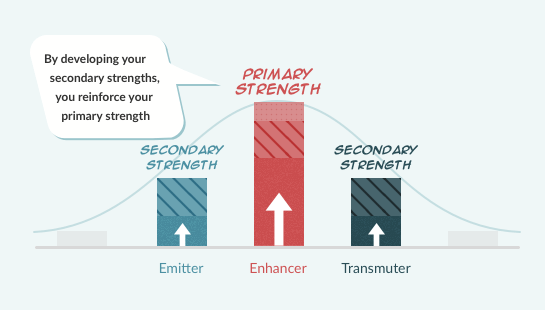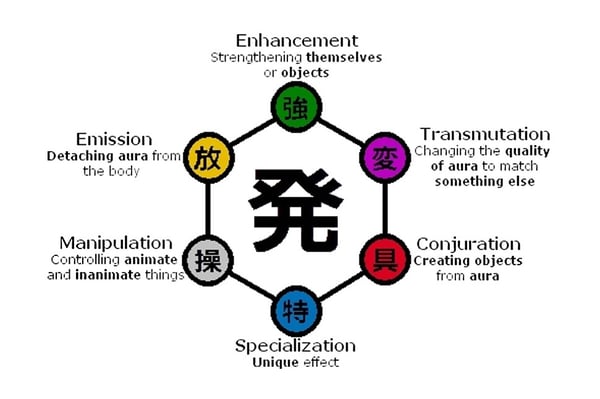
By Eugenie Chen, Director of Analytics
As someone working in analytics, I often have to figure out a way to connect data points from various sources and translate them into meaningful findings. The type of work I do makes me constantly think about connections among different topics and fields both inside and outside of work, which led me to write this blog post.

I was inspired by a Japanese anime I have watched since childhood. The anime was adapted from Yoshihiro Togashi’s manga series of the same name: Hunter x Hunter. Some of the training ideas around nen, a fictional ability to control one’s energy, piqued my interest in personal development, so I took the concepts a step further and explored how they could apply to career development.
In the world of Hunter x Hunter, users of nen are born with one of six nen types. The nen users are only able to reach 100% of that type of nen if they are born with it. Additionally, to become a skilled nen user, one has to go through a series of rigorous training activities and often needs the guidance of nen masters. The nen masters have developed their own systems of training, some of which resonate with career advice I’ve read and received. To get us started, here are my key takeaways from the nen training systems, broken down in the context of career development:
-
Start with strengthening the type of nen you were born with*
-
Interpretation: Focus on your natural talent first and turn it into your primary strength
-
-
Train the nearby types of nen to further strengthen your own type*
-
Interpretation: Find the commonality between your primary strength and the other areas you want to focus on, which you may consider to be your secondary strengths, and then work on those areas to further boost your primary strength to the very top. This is similar to the idea of using cross training to improve one’s performance in a different function.
-
-
Don’t focus on a nen type for which you are not naturally suited (also referred as “memory overload” by one of the nen masters)^
-
Interpretation: Don’t spend too much time fixing your weaknesses
-
Now you may wonder: how do we put these key takeaways into practice and where should we start? First, let’s ask ourselves two simple questions:
-
What are you most naturally good at?
-
What do you enjoy doing the most?
 From Hunter X Hunter, “In the case of an Enhancer, you’d want to focus on your Enhancer skills (first), while training the nearly categories of Transmuter and Emitter in a balanced fashion. Then you’ll master your own category faster.”
From Hunter X Hunter, “In the case of an Enhancer, you’d want to focus on your Enhancer skills (first), while training the nearly categories of Transmuter and Emitter in a balanced fashion. Then you’ll master your own category faster.”
Some of us may already know the answers, while some of us could use some help from family and friends. Once we know where our talent lies and what our passion is, we can then begin exploring our own career paths. Below is a five-point checklist that can serve as a quick head start.
1. Identify what you’re naturally good at and enjoy doing, then turn that into your primary strength

You’re most likely to succeed in something that you have a natural talent for and are passionate about. For example, if you’re naturally good at and enjoy identifying trends and patterns within a dataset, consider how you could make these observations more meaningful. As a data analyst, you would turn them into actionable insights for your client. By repeating the process again and again, eventually you will be able to quickly draw meaningful insights from any new dataset. Ultimately, the “advanced version” of what you’re already good at is your primary strength.
And just to clarify: a skill is not a strength! According to career solutions provider abintegro:
“Skills are often described as something you learn how to do through repetition, [while] strengths are defined as things we are naturally good at and didn’t really have to learn.”
Developing skills within your areas of strength, however, could further enhance your portfolio of strengths and turn it into something that’s unique to you.
2. Develop complementary secondary strengths to reinforce your primary strength and improve your overall competence

The analogy of cross training aptly describes the process of building your secondary strengths. As one expert from Harvard Business Review explained,
“[An] experienced marathoner won’t get significantly faster merely by running ever longer distances. To reach the next level, [s]he needs to supplement that regimen by building up complementary skills through weight training, swimming, bicycling, interval training, yoga, and the like.”
Applying the concept of secondary strengths to analytics career development: if you’re good at absorbing technical knowledge and putting it to use, perhaps consider bettering your communication and presentation skills to empower other team members with the knowledge you’ve developed, and collaborate with your teammates to build a process for ongoing improvements.

3. Don’t spend too much time fixing your weaknesses
We’ve discussed why you should focus on what you’re naturally good at doing, but let’s also talk about why you should not focus on fixing what you’re not good at doing. The major reason behind this is resource constraint: you have a limited amount of time and energy, so you’ll be better off perfecting your strengths and turning them into your differentiator than fixing your weaknesses.
4. Share best practices and learn from those around you
As a hiring manager, one question I often receive during interviews is: “What’s your favorite part about Vistar?” And I always give out the same answer: “The people.”
Being surrounded by smart and hardworking people makes me look forward to coming to work everyday because I know there’s always something new I can learn from those around me.
5. Go have some fun! Get inspired by life outside of work
Similar to how this blog post was inspired by a Japanese anime, we’re often inspired by things outside of work. At the end of the day, having a good work-life balance is important not only to our physical and mental health, but is essential to being able to produce innovative ideas.
So, what do we look for in an analytics candidate at Vistar?
Typically, we want someone who…
- Has served as the subject matter expert of a topic, a field, or a process in a previous role
- Can bridge the gap between technical & non-technical audiences
- Is always on the lookout for efficiency improvement, innovative ideas, and new learning opportunities
Up for the challenge? Click the button below to learn more about our open positions.
Notes:
*This refers to the character Biscuit Krueger
^ This refers to the character Hisoka Morow
References:
-
Kōjina, Hiroshi (Director). (2011 - 2014). Hunter x Hunter [Anime television series]. Tokyo, Japan: Madhouse.
-
Nen. Retrieved from http://hunterxhunter.wikia.com/wiki/Nen
-
Hunter × Hunter. Retrieved from https://en.wikipedia.org/wiki/Hunter_%C3%97_Hunter
-
Zenger, J. H., Folkman, J., & Edinger, S. (2011, October). Making Yourself Indispensable. Retrieved from https://hbr.org/2011/10/making-yourself-indispensable
-
Altman, I. (2015, September 21). Don't Waste Time Fixing Your Weaknesses. Retrieved from https://www.forbes.com/sites/ianaltman/2015/09/15/dont-waste-time-fixing-your-weaknesses/#7d635e1b300e
-
Abintegro. (2016, July 7). Strengths vs Skills: What's the difference?



